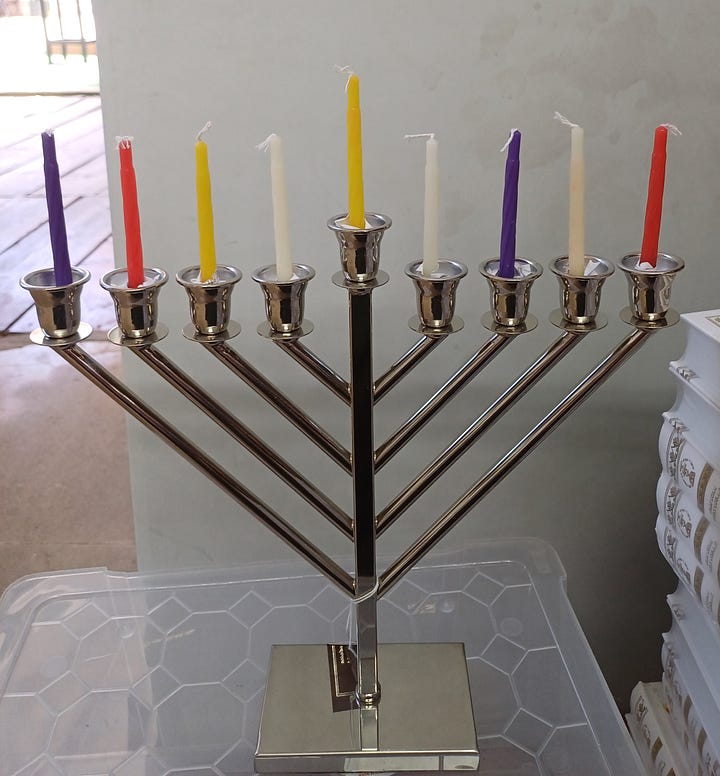The Importance of Discord
Jews are known for being argumentative--and it has helped us survive
Within the slew of antisemitic posts on social media, anger and jealousy at Jewish success is one of the most common topics. The reasoning is that if Jews and Israelis are successful beyond their percentage of the population, they must be manipulating the system, which means the Jews control the world, which is unfair to everyone else.
As I see it, there are two major reasons Jews have survived and thrived 3,000 years of attempts to destroy us. The first, simply, is that God made us the eternal people so we cannot be destroyed completely. The second, more in tune with today’s secular world, is because Jewish culture leads to success. Fundamentally this second idea is a subset of the first, since God gave us His laws and set out the ways society should be set up and run for maximum success, which we religious Jews have done to the best of our ability. The information of how to do this is there for any group that wants to follow it, but none has adopted the civil laws as a whole.
One way that Jewish culture encourages success is, I believe, our comfort with contradiction and discord.
Embracing Discord as a Factor in Learning
A common aphorism among us is, "Two Jews, three opinions." A joke: two men go to the rabbi with a dispute. One man gives his side of the problem and how the matter should be resolved. The rabbi thinks for a moment and says, "You're right." Then the other man gives his side. After some thought, the rabbi says, "You're right." The two men say "How can we both be right?" The rabbi replies, "That's also right."
The Talmudi is the compilation of a thousand years of the Jewish oral tradition that was put into written form in the 2nd century CE.ii Much of the Talmud is composed of discussions and even heated arguments between or among Torah scholars as to what something means or how something should be interpreted. An example is the relationship of Shammai and Hillel, whose opinions often differed. A famous case is over Hanukkah candles. Shammai said all should be lit the first night, the number diminishing through the holiday. Hillel said that the number of lights should increase.iii Hillel's opinion was accepted.


The Talmud records the many discussions and says, "The law resides with..." whichever one's argument was chosen by the Sanhedrin, the leaders at that time.
As we Jews see it, there are many ways of understanding and being. Everyone's perspective is different. And excepting those that contradict God’s laws, we can learn from all of them.
The Ten Commandments
The Ten Commandments are basic truths, laws that cannot be abrogated: honor your parents, do not worship idols, do not steal, murder, lie in front of a judge or through gossip, covet what your neighbor has, do not commit adultery. Without these basic laws people live in chaos.
There are other laws, based on the Ten Commandments, that make the most rudimentary society more civil: laws about property rights (tort law) and those about violence against others, for example.
Even within these groups there is difference of opinion. When is killing another person murder? Is it ever justified? If so, when and under what conditions? Did these particular circumstances justify it in this particular case?
The famous statement "an eye for an eye, a tooth for a tooth" appears three times in the Five Books of Moses.iv But, as I have mentioned in previous posts, those famous Five Books are notes that Moses took during the 40 days he was on Mt. Sinai learning Torah directly from God. The full meaning, fleshing out those brief words, is found in the Talmud. And...there is no one, simple, straightforward answer to what those words mean, because (I hate to write these electrified words) context matters.
Additionally, since the First Temple was destroyed and the Ten Tribes of Israel were removed to Babylon and then dispersed,v there has been no central Jewish authority, religious or secular. Local rabbis form their own individual courts to adjudicate issues of Jewish law that come up in their jurisdictions. Rabbis who answer questions about the application of law also apply local realities.
The use of glass dishes is an example. According to the kosher laws, glass can technically be used for both meat and milk. In the USA, a rich nation where today a 1,000-square-foot home is considered too small for families with three or more children, most Orthodox rabbis say that while having only one set of glass drinking glasses is permitted, two sets--one for use with dairy meals and one with meaty meals--is much better. However, using one set of glass dishes for both meat and milk is not acceptable.
Israel, however, is a far poorer country. When, for example, Moroccan Jews were expelled from that land and came to Israel they were housed in quickly-built settlements where each family had a one- or two-room apartment and a large garden. Some of my friends' youngest years were spent in 200 square foot apartments with seven or ten siblings. Today, even with the booming economy before the current war, I have two married friends, in two-income families, who live in 900-square-foot apartments with four children each. Additionally, our defense expenses, the socialist history of the country, and graft have led to a very high cost of living. Many people still live with kitchens smaller than the pantries in a lot of new American homes. The standard of living is far lower than in the USA and many families struggle to pay their bills. Here, rabbis generally approve of using one set of glass dishes for all meals, as long as they are thoroughly washed in between.
Because we Jews are comfortable with ambiguity, it is easier for us to study alternatives with an open mind. This gives us the edge at solving complex problems over people whose minds are more closed.
Unfortunately, the reluctance to consider alternatives is a western value that many secular Jews today have adopted. A large percentage espouse progressive political views even though those demonize Israel and the Jewish people.
What about Israel's Civil Discord?
Commentators from outside Israel have for years spoken about the civil war that they believe is brewing in Israel. The Left, funded according to the word on the street by George Soros and other progressives from outside, has for many years caused frequent disturbances in this small country. Yet not only is Israel still in one piece, the nation rated 8th happiest in the world--in a time of war. How can this be?
This is because Israelis--Jews particularly, but the feeling rubs off on some non-Jews as well--know that they are a family. Families often disagree, and here in Israel they rarely fall apart. Unlike in the USA, where political discord often decays into the destruction of family relations, Israelis are mostly able to argue furiously while acknowledging that they are still part of a strong family.
Lulav as Metaphor
A lulav is composed of a palm frond, branches of myrtle and willow, and an etrog, known in English as a citron. Without all four species a lulav cannot be used in the Sukkot festival. Among one of the explanations for the composition of the lulav (we thrive on discord, right? So there are many explanations) is that each species represents one type of person. The palm branch has flavor but no odor. Myrtle has a scent but no flavor, Willow has neither, and citron has both. In the same way, different people have different characteristics. The lulav teaches us that all kinds--of vegetation, of humans--are needed to have a complete whole. And so leftists and rightists are both needed to keep the country in balance.
Balance and Discord
Look at what happens when balance is missing: radical Islam is at this time unopposed in the world sphere of influence. As we see from massacres in Kashmir, Bangladesh, Nigeria and other sub-Saharan African nations, and Israel, they have gotten way out of hand. Muslims who might be moderate have no spokesman. The same was true in Nazi Germany and the Soviet Union, when Hitler and Stalin eliminated their opposition: there was no stopping them.
Until the last ten or fifteen years, most people in the USA espoused free speech, even if they did not completely agree with the principle; and the USA flourished. Increasing polarization has been associated with riots, inflation, an unstable economy, and more. The very foundation of the USA has become shaky, with legislators in some states whispering about seceding from the union.
An appreciation of and habit of argument with the possibility of finding middle ground is necessary for a flourishing society. Judaism, which has survived 3,000 years of attempts to eradicate it, and Israel, which has survived constant violence and many wars in its short existence, are stellar examples of the kinds of societies that are possible when discord is not only permitted, but expected and even sometimes celebrated.
When the world can set its antisemitism aside and start to learn from Israel, it might become much more peaceful.
If only!
i The Talmud is a thousand years of the Jewish oral tradition, compiled in written form in the 2nd century of the common era.
ii C.E. or Common Era is used by Jews instead of A.D., Anno Domini or Year of Our Lord, which refers to Jesus. Likewise, we use BCE, Before the Common Era, instead of BC, Before Christ. Before you get insulted, think about how you'd feel if you had to write after dates AM, meaning after the birth of the founder of Islam.
iiiWeinbach, Mendel, Understanding the dispute between Beit Hillel & Beit Shammai. www.ou.org/holidays/some_talmudic_insights, accessed May 20, 2025.
iv Exodus 21:24; Leviticus 24:20, and Deuteronomy 19:21.
vLost, perhaps, to the western world; but many groups of Jews from central Asia, expelled from those Muslim countries when Israel was established, trace their roots to those tribes. And the Bene Menashe people of northeastern India are descended from the tribe of Menashe and still maintain some customs and laws from First Temple days.




I never looked at it this way. Now I understand what I've learned about times of moshiach, where we are not all clones of thought and action, but where people respect the others opnion even if you don't agree.